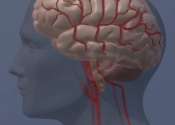Blueberry concentrate improves brain function in older people
Drinking concentrated blueberry juice improves brain function in older people, according to research by the University of Exeter.
Mar 7, 2017
4
5216
Drinking concentrated blueberry juice improves brain function in older people, according to research by the University of Exeter.
Mar 7, 2017
4
5216

A new study published in Frontiers in Behavioral Neuroscience today is setting out to change the way we think about the menstrual cycle. While it's often been assumed that anyone who's menstruating isn't working at top mental ...
Jul 4, 2017
4
3805

The perception of having Albert Einstein's body may help unlock previously inaccessible mental resources, finds a new study. Following a virtual reality "Einstein" experience, participants were less likely to unconsciously ...
Jul 9, 2018
7
791

The development of drugs to treat cognitive problems in patients with mental illness may be a step closer after a team of researchers discovered that an existing drug—used to treat constipation—may be able to boost our ...
Oct 4, 2021
0
475

There are no laboratory tests to diagnose migraines, depression, bipolar disorder and many other ailments of the brain. Doctors typically gauge such illnesses based on self-reported symptoms and behavior.
Apr 18, 2018
0
970

A brief visual task can predict IQ, according to a new study. This surprisingly simple exercise measures the brain's unconscious ability to filter out visual movement. The study shows that individuals whose brains are better ...
May 23, 2013
3
0

A recent study by a University of Arkansas researcher, Darya Zabelina, assistant professor of psychology, takes a new approach to measuring the association between creativity and cognitive control, that is, the mind's ability ...
Mar 6, 2018
4
1194

Children who begin reading for pleasure early in life tend to perform better at cognitive tests and have better mental health when they enter adolescence, a study of more than 10,000 young adolescents in the U.S. has found.
Jun 27, 2023
0
871

The English idiom "highbrow," derived from a physical description of a skull barely able to contain the brain inside of it, comes from a long-held belief in the existence of a link between brain size and intelligence.
Nov 30, 2018
10
409

Controlling blood sugar levels improved the ability to clearly think, learn and remember among people with type 2 diabetes who were overweight, a new study shows. But losing weight, especially for people who were obese, and ...
Oct 2, 2020
0
227
